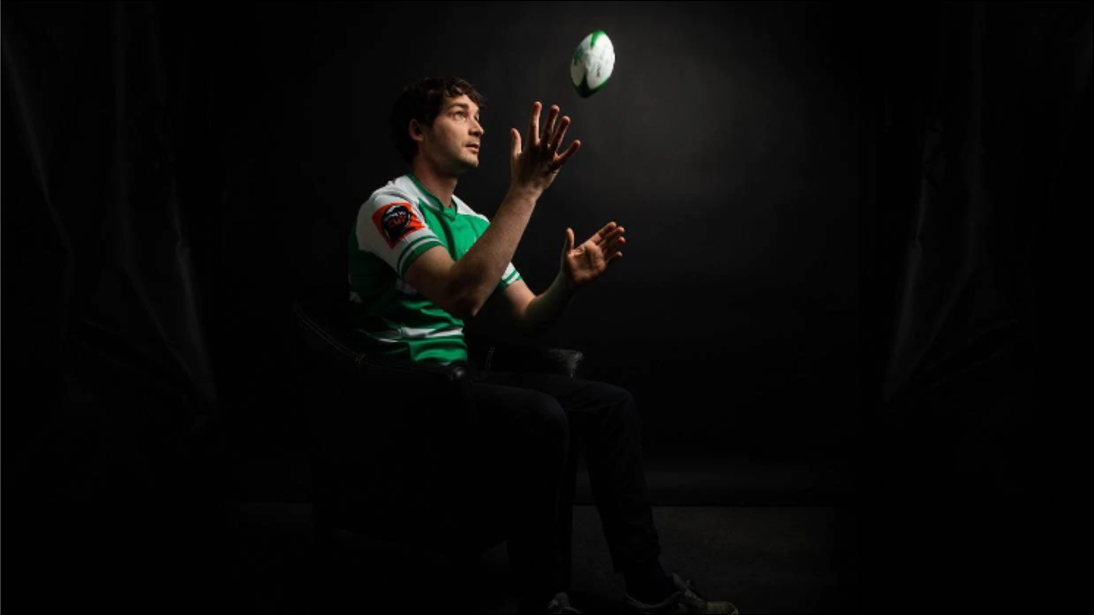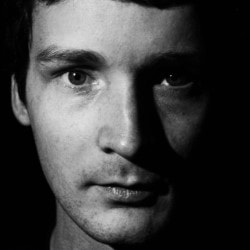Emilie Hope
When I think of rugby, I think of my childhood. I think of the cold Waikato winters, when we travelled down the road to our neighbour’s house, an elderly lady who had Sky TV (we did not). I snuggled up to the gas heater while my brother, dad, good ole Dawn sat on the couch. She made me a watery Milo at halftime, served with shortbread biscuits. The four of us were entertained with All Black patriotism, a little family bonding over ninety minutes every winter Saturday. I wasn’t much impressed with my watery Milo but drank it anyway. This was my experience of Bleeding Black.
Christopher Watts is the man behind this one-man show. With only Watts and his stage manager and operator, Ella McLeod, credited, it really is just that. Watts plays Sam, a (quite literally) rugby-mad Kiwi bloke. Sam walks onstage in the Heyday Dome and is stunned by the audience, like a deer caught in the headlights. This read as quite odd and fake in the “I am not suspending my disbelief” way as we were in darkness. I felt it was a missed opportunity not to have the audience in some light as well throughout the show, especially as he talks directly to us. Sam slowly makes his way over to the centre stage, and after a drawn out self-scolding, he spins around and says “Kia ora, I’m Sam.” He explains that “Greg” (a character never mentioned again) asked him to talk about his experience growing up in New Zealand to a couple of his mates. This may have been adjusted for an Edinburgh audience, but Watts should be flexible enough to adjust to the audience in front of him. “A couple,” he says nervously, looking at the audience. We laugh. This is the briefly-mentioned-and-never-returned-to framing narrative: Sam is telling us about his life, and specifically about rugby and how it started from playing the game at the age of five, an influence from his father, through to how this way of life affects him as a rugby-fevered fan in his mid-twenties living in Wellington.
Through the show, he realises it affects him quite negatively. He never wanted to be like his dad, a man for whom rugby was the sun. He missed Sam’s mother’s birthday and seemed wholly uninterested in Sam’s life as a young boy growing up in Palmerston North, except when he was playing rugby. “I learnt to love rugby because that’s how I learnt to love Dad,” Sam explains. This was only the start, his father constantly pushing him as his coach, the sport connecting the two. When Sam got older and his father stopped being his coach, he didn’t want to waste all his hard work. “Harden up or stop playing,” both his father and future coaches said. He wanted to prove himself to the new coaches and himself. When university and the alluring Wellington appeared, his rugby craze switched from playing to watching amongst his studies and socialising. This metaphor, the idea of this sport and the community around it (merchandise, watching at the pub, etc.) became a kind of drug that was a vicious cycle, could be brought out more: rugby was the sun, uni and work as a checkout operator at New World paled in comparison, and therefore he became worse at uni and work. He felt bad about his life going down the drain, so he would watch rugby as a pick-me-up.
The show also talked about domestic violence. We could see the pattern and the journey leading up to him hitting his girlfriend Lily, whom was once all he wanted in first seeing her. This is a very apt note that I think is especially important when telling a story both about New Zealand and the rugby culture. Let us not forget that domestic violence rates always go up around big New Zealand sporting events, including the Rugby World Cup. There is a connection here that needs to be examined. However, Bleeding Black doesn’t examine it enough. When casting a light on these issues, having them sit on the sideline made it feel like an afterthought.
While the show is very bare bones, I found myself charmed by Sam. His enthusiasm for rugby was infectious. Even if you have no knowledge of rugby, his energy washes over you so that you’re willing to ride the river. He name drops Jonah Lomu, Tana Umaga, and Richie McCaw so we are on the same page as to the level he aspires to, first as a player, and then later as a fan: “I’m not sure I was quite ready for the All Blacks.” However, Sam doesn’t feel like an authentic character. Many of his small character “quirks”, like the self-scolding, felt over-dramatised, lessening their effect. Gags such as being incredibly thirsty from all the running around on stage and drinking from the jug instead of from the coffee cups were cliché but also didn’t have a payoff: he didn’t scull down the entire jug of water. This instead was used as a metaphor later in the show about wanting to be clean or born again, which felt tacked on at the end rather than being present throughout.
There were inconsistencies with the “rules” of the performance as well. Sometimes he transitioned into embodying Sam’s dad or coaches, which was done well and the two men felt different, but at other times he pretended he was talking to someone, usually his female boss or Lily. This doesn’t bode well as Watts continues to remove women from the story that he seems to want them to be a part of.
The stage is black and bare with only a few items. There’s a small coffee table with disposable coffee cups, a jug of water, and some folded rugby shirts. It’s quite a wide but shallow stage and it takes a lot for one person to fill it. To Watt’s credit, his physical feats of sprints, crunches, and the trauma-inducing burpees (I. Really. Hate. Burpees) helped make the space seem not so big, although the occasional lighting spotlights really did shrink the space.
The lighting changed often, jarringly transitioning from a general washes to spotlights and even some red later in the show. The basic lighting was used comically to show a change in character or place, but was not consistent enough for me to commit a particular lighting state with a character or place to memory, thus making it seem random and quite frankly cringy. Also, the lack of music or added sound effects gave the atmosphere an empty feeling, drawing much pressure to Watt’s solo performance.
Bleeding Black has a lot of potential. There are some intriguing themes that he voices, such as the complete eclipsing feeling the sport has on some men and domestic violence, but is unable to convey these in a dynamic way. Bleeding Black needs a clearer focus, something another writer, a director, or dramaturg could support Watts with. I walked out of BATS feeling glad it was only an hour show, in which I learnt very little. Perhaps if the show was put on in the media swirl lead up to the 2019 Rugby World Cup, I would have been able to be more excited about the show. Ultimately, like my watery Milo, I enjoyed the chocolate bursts but the lack of creaminess was not enough to make me want a second serving.







